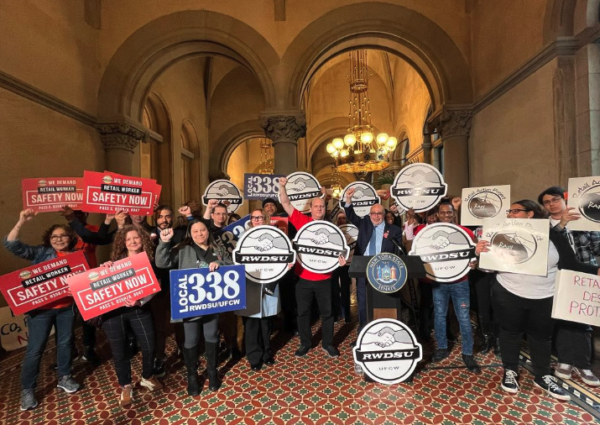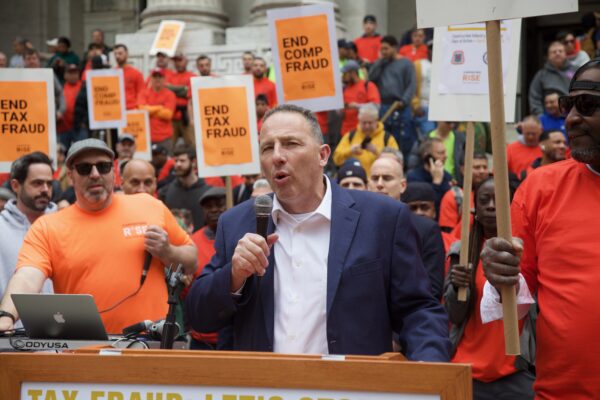December 17, 2013
By Marc Bussanich
Philadelphia, PA—For 15 years the Pennsylvania General Assembly couldn’t pass a transportation bill to fund improvements and upgrades to the state’s highway and mass transit networks. But last month, Republican Governor Tom Corbett signed a $2.3 billion transportation bill and said barely a spot in the state would not a see an improvement because of the legislation.
According to the Greater Philadelphia Chamber of Commerce and the Philadelphia Building Trades, a broad coalition of business and labor groups working together for three years helped finally persuade the General Assembly to pass the new transportation bill.
Liz Ferry, Vice President for Communications with the chamber of commerce, said the chamber worked tirelessly with members of the Keystone Transportation Funding Coalition, made up of members of the construction industry, public transit agencies and labor organizations, to ensure the bill passed.
“We worked very hard for this funding measure, the first one in 15 years, because we view it as terribly important to economic growth in the Commonwealth,” said Ferry.
Funding for the new bill will come from an increase in the gas tax (about 28 cents a gallon based on 2013 prices) and increased vehicle registration, driver’s license and moving violation fees phased in over five years. The bulk of the money—$1.65 billion— will go towards highway and bridge repairs, while $475 million will go to the state’s two main mass transit systems—the Southeastern Pennsylvania Transportation Authority (SEPTA) serving the Philadelphia area and the Allegheny Port Authority serving the Pittsburgh area.
Andrew Busch, a spokesman for SEPTA, said the transit agency views the new funding mechanism as transformational.
“The new funding will allow us to make critical investments to keep the core of our system running and replace aging infrastructure such as 100-year old railroad bridges and power substations that date back to the 1930s,” said Busch.
SEPTA’s ridership, like many other mass transit systems in major urban areas around the country, is growing; the agency now carries about 1 million riders per weekday. To keep the rail system running safely and efficiently, SEPTA has pursued federal grants, such as Transportation Investment Generating Economic Recovery grants on an annual basis.
But the new funding mechanism provides SEPTA with a multi-year funding stream for the next five years, which Busch says makes the agency optimistic about formulating a new five-year capital plan that will allow the agency to modernize passenger stations, replace aging equipment and immediately start work on old infrastructure.
The new transportation bill is good news for Philadelphia commuters because if the funding didn’t come through, SEPTA had plans on significantly scaling back service. Busch noted that the agency had prepared a doomsday budget and a service realignment plan in September that would have eliminated 9 out of 13 regional rail lines, truncated service on two others and forced the agency to retire its trolley cars and replace them with buses.
“We had to be realistic about the future. That would have been the unfortunate reality, but luckily it didn’t come to pass,” Busch said.
Pat Gillespie, business manager for the Philadelphia Building and Construction Trades Council, said the $2.3 billion transportation bill would bring much needed work to his members fixing the state’s structurally deficient roads and bridges and repairing and upgrading mass transit systems.
Even with a formidable coalition of business groups, labor organizations and mass transit advocates working together to persuade the state’s General Assembly to pass the first transportation bill in 15 years, concessions were still necessary.
According to Gillespie, the building trades in Philadelphia and the laborers union in Pittsburgh agreed to an increase in prevailing wage requirements on transportation projects from $25,000 to $100,000.
“For us that was a pretty draconian thing to do, but we figured better to do that and live and fight another day than no transportation bill at all,” said Gillespie.
He noted that some building trades’ locals throughout the state were unhappy with the decision, but that the Philadelphia building trades and the Pittsburgh-area laborers agreed to the concessions because another year without transportation funding in a still fragile economic recovery was unacceptable.
“The art of negotiations is that each side gives a little for the greater good. No one likes to focus on that, but we now have a significant budget that’ll be able to improve our mass transit systems and improve the conditions of Pennsylvania’s bridges and highways,” Gillespie said.
Follow Marc Bussanich on Twitter marc@laborpress.org



